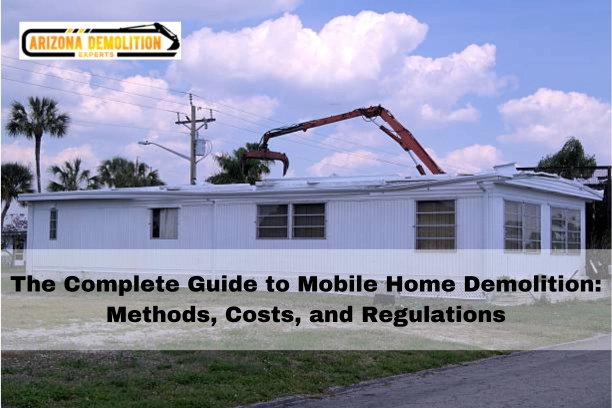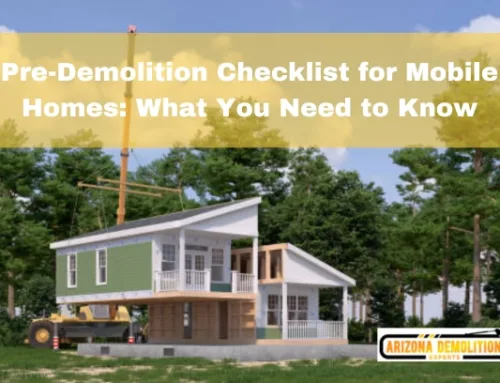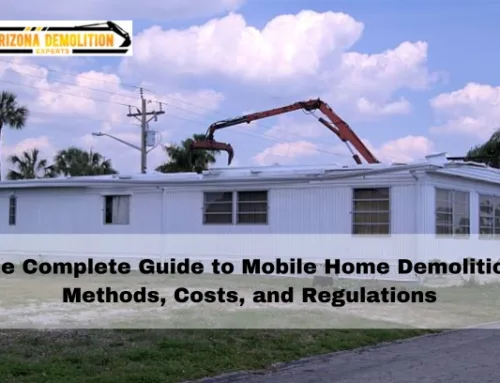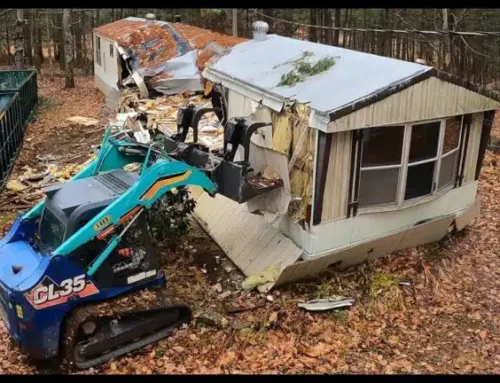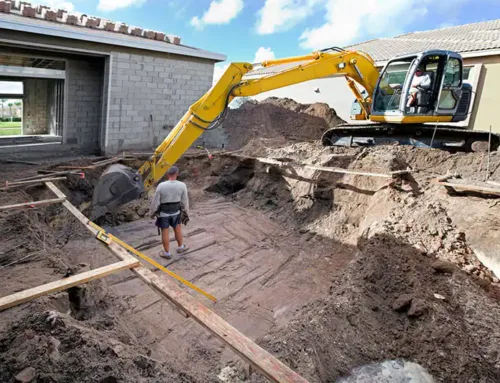The decision to demolish a mobile home should not be taken lightly. With the growing importance of residential demolition, particularly in the context of urban renewal and property redevelopment, the need for a thorough understanding of mobile home demolition has never been more critical. Proper planning and adherence to regulations are not just a matter of legal compliance; they are crucial in ensuring the safety, efficiency, and environmental responsibility of the demolition process.
Whether you’re a homeowner looking to clear a lot for new construction or a demolition contractor tasked with the job, understanding the intricacies of mobile home demolition is essential. This comprehensive guide is designed to walk you through every step of the process, ensuring that your demolition project is carried out smoothly, efficiently, and in accordance with all necessary regulations.
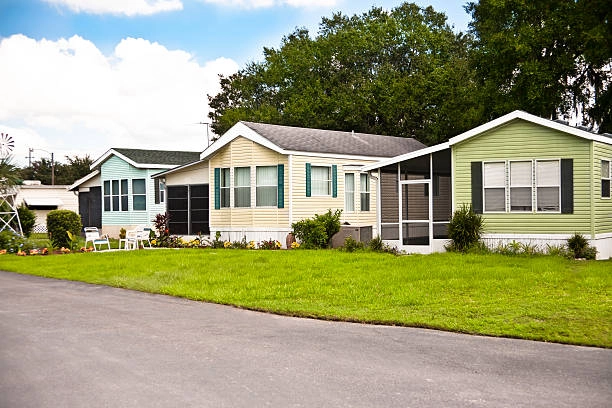
Pre-Demolition Considerations
Evaluating the Need for Demolition
Before demolishing a mobile home, assessing the structure’s condition and considering the feasibility of renovation versus demolition is vital. This assessment should consider the home’s age, its structural integrity, and the cost implications of each option.
- Condition Assessment: A detailed inspection to evaluate the mobile home’s structural health.
- Renovation vs. Demolition: A cost-benefit analysis to determine the most practical and economically viable option.
Securing Necessary Permissions
Navigating local regulations and obtaining the required permits is crucial in the mobile home demolition process. Each jurisdiction may have different requirements, making it essential for homeowners or demolition companies to familiarize themselves with these regulations.
- Local Regulations: Understanding the specific laws and guidelines in your area.
- Obtaining Permits: A step-by-step guide on securing the necessary approvals before commencing demolition.
Environmental Impact and Safety Measures
Identifying and mitigating the environmental impact of a demolition project is a responsibility that demolition contractors and homeowners alike must take seriously. This involves recognizing hazardous materials that may be present and ensuring that safety protocols are in place throughout the demolition process.
- Hazardous Materials: Identifying substances like asbestos or lead that require special handling.
- Safety Protocols: Implementing measures to protect workers and the surrounding community during demolition.
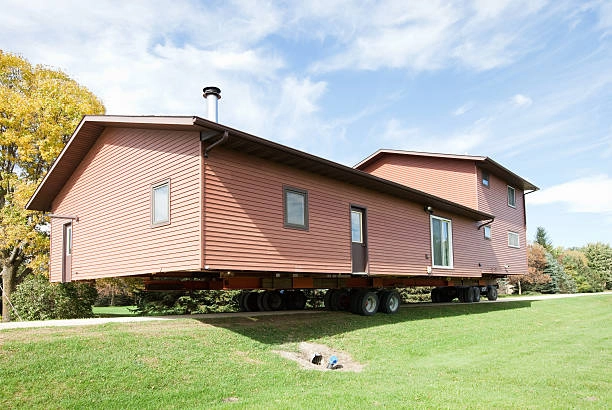
Exploring Demolition Methods for Mobile Homes
When taking down a mobile home, the chosen method can significantly impact the project’s cost, duration, and environmental footprint. This chapter delves into the primary approaches used in mobile home demolition, each with its own set of tools, techniques, and considerations.
Manual Demolition: A Hands-On Approach
Manual demolition is as straightforward as it sounds but requires a detailed plan and a dedicated team. This method is particularly effective for smaller mobile homes or in situations where precision is crucial to avoid damage to surrounding properties or to salvage materials.
- Tools and Techniques: The manual method relies on a variety of hand tools, including sledgehammers, pry bars, and saws. Techniques vary from stripping out interiors to dismantling the structure piece by piece.
- Manpower Requirements: The number of workers needed depends on the size of the mobile home and the project timeline. A team can range from a few skilled individuals to a larger crew for quicker demolition.
Mechanical Demolition: Efficiency at Its Best
Mechanical demolition offers a fast and effective solution for larger mobile homes or when time is of the essence. This method employs heavy machinery to tear down structures, making it suited for comprehensive demolition projects.
- Equipment Used: Common machinery includes excavators, bulldozers, and cranes equipped with demolition attachments like claws, hammers, or shears.
- Suitability for Different Structures: Mechanical demolition is best suited for mobile homes that are too dilapidated for salvage or when the project site is clear of obstructions that could impede machinery.
Deconstruction: Prioritizing Salvage and Recycling
Deconstruction stands out as the most environmentally friendly option, focusing on dismantling a mobile home to allow for the maximum reuse and recycling of materials. This method is ideal for projects where environmental impact is a primary concern.
- Benefits of Material Salvage: By carefully deconstructing a mobile home, valuable materials such as wood, metal, and fixtures can be recovered and reused, reducing waste and supporting sustainability efforts.
- Recycling Opportunities: Deconstruction facilitates the sorting and recycling materials, from metals to certain types of plastics, contributing to a circular economy and potentially offsetting some of the demolition costs by selling salvaged materials.
Each demolition method has its unique set of advantages and considerations. Whether opting for the meticulous process of manual demolition, the efficiency of mechanical demolition, or the eco-friendly deconstruction approach, understanding these methods ensures that your mobile home demolition project is aligned with your goals, budget, and environmental values.
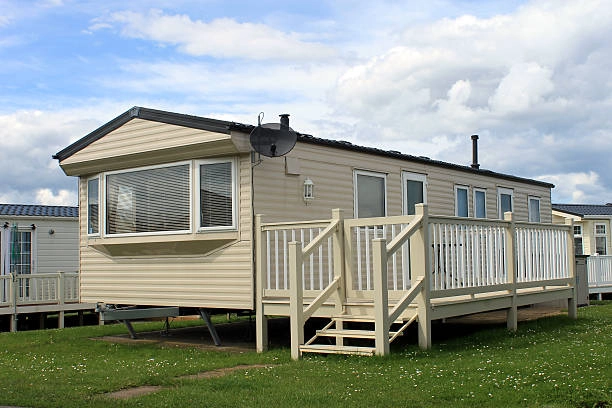
The Cost of Mobile Home Demolition
Estimating Your Demolition Budget
A crucial initial step in planning a mobile home demolition project is establishing a realistic budget. The costs can vary significantly based on several factors, requiring thorough consideration to ensure financial readiness.
Factors Influencing Demolition Costs
- Size and Structure of the Mobile Home: Larger homes or those with more complex constructions typically incur higher costs.
- Demolition Method: Whether opting for manual, mechanical, or deconstruction methods, each has cost implications.
- Location and Accessibility: Remote or hard-to-access locations may lead to additional transportation and labor costs.
- Disposal Fees: Charges for debris disposal can vary widely by location and the amount of waste generated.
- Hazardous Materials: Asbestos, lead, or other hazardous materials can significantly increase costs due to specialized removal processes.
Hidden Costs and Budgeting Tips
Unexpected expenses can derail your budget if not accounted for. Here are tips to manage your finances effectively:
- Contingency Fund: Allocate 10-20% of your budget to cover unforeseen costs.
- Get Multiple Quotes: Solicit detailed quotes from several demolition contractors to compare costs and services.
- Understand the Full Scope: Ensure the quotes include all necessary services, including permits, utility disconnections, and debris removal, to avoid surprise charges.
Avoiding Unexpected Expenses and Financial Planning
Effective financial planning is key to a smooth demolition process. Here are strategies to keep your project on budget:
- Detailed Contract Review: Ensure all potential costs are clearly outlined in the contract with your demolition contractor.
- Regular Communication: Stay in close contact with your contractor throughout the project to quickly address any budgetary concerns that arise.
- Research Local Regulations: Familiarize yourself with local regulations that may impact project costs, such as disposal fees and permit requirements.
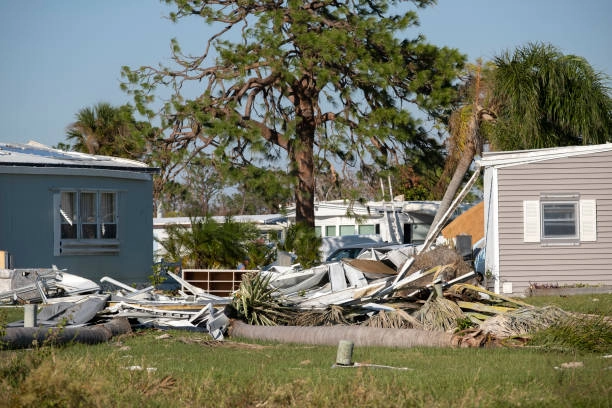
Navigating Demolition Regulations and Avoiding Pitfalls
Understanding Local Demolition Regulations
Compliance with local laws and regulations is non-negotiable in demolition projects. These guidelines are designed to ensure safety, environmental protection, and community welfare.
A Guide to Compliance and Avoiding Legal Issues
- Research Local Demolition Permits: Contact your local building department to understand the necessary permits and how to apply for them.
- Environmental Regulations: Be aware of any local environmental regulations that may require special handling or disposal of materials.
- Noise and Dust Control: Some areas have regulations regarding noise levels and dust control during demolition. Ensure you have plans in place to comply.
Dealing with Utilities and Services
The safe disconnection of utilities is a critical step that must be managed well in advance of the demolition start date.
Safe Disconnection and Removal Processes
- Electricity and Gas: Contact your utility providers early to schedule disconnection services. This is crucial to prevent accidents.
- Water and Sewer: Ensure water lines and sewer connections are properly sealed to avoid leaks and contamination.
- Communications Services: Don’t forget to disconnect phone, cable, and internet services, if applicable.
Avoiding Common Mistakes
Learn from the experiences of others to avoid common pitfalls in mobile home demolition.
Lessons Learned and Best Practices
- Underestimating the Scope of Work: Always assume that the project may be more complex than initially thought. Plan accordingly.
- Neglecting Safety Protocols: Safety should never be compromised. Ensure all workers are briefed on safety measures and equipped with the necessary gear.
- Improper Waste Disposal: Follow local guidelines for waste disposal strictly to avoid fines and environmental harm.
- Failing to Disconnect Utilities Properly: This can lead to dangerous situations. Double-check that all utilities are disconnected before beginning demolition.
By taking these considerations into account and planning meticulously, you can navigate the complexities of mobile home demolition effectively. This comprehensive approach ensures that your project complies with regulations, stays within budget, and proceeds smoothly from start to finish.
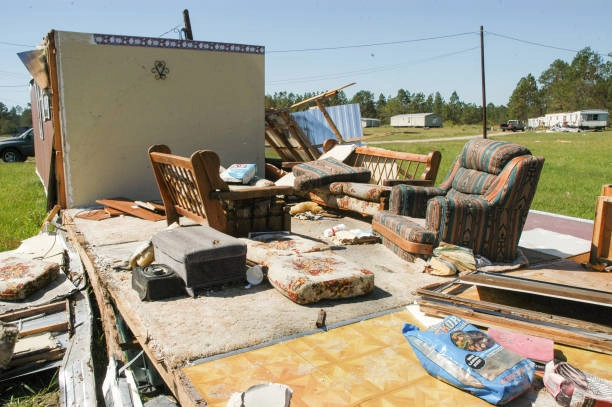
After Demolition: Cleanup and Land Preparation
The completion of a mobile home demolition is not the end of the project but rather a transition to the next phase: cleanup and land preparation. Properly managing this stage is crucial for setting the foundation for future projects and ensuring environmental compliance.
Managing Debris and Waste
The aftermath of a demolition leaves behind a significant amount of debris and waste, which must be handled responsibly.
Options for Disposal and Recycling
Segregate materials into recyclables and non-recyclables. Many components of mobile homes, such as metal, wood, and certain plastics, can be recycled, helping to reduce the environmental impact. Non-recyclable materials should be disposed of in accordance with local regulations, which may involve hauling the debris to a licensed landfill.
Hiring a Professional Waste Management Service
Consider hiring a professional service specializing in construction debris removal for efficiency and compliance. They can manage the segregation, recycling, and disposal process, ensuring it meets all regulatory standards.
Preparing the Site for Future Use
Once the site is cleared, preparing it for its next use is a vital step. This might involve new construction, landscaping, or other developments.
Soil Testing
Conduct soil testing to check for contamination and to determine the soil’s composition. This is particularly important if the site will be used for residential purposes, as certain contaminants can pose health risks.
Leveling and Grading
The site may need to be leveled or graded to prepare for future construction. This process ensures proper drainage and provides a stable foundation for building structures.
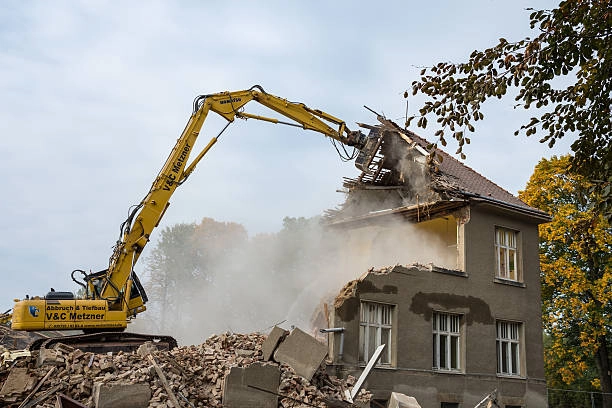
Why Opt for a Demolition Contractor
When it comes to mobile home demolition, the decision to hire a professional demolition company is not just a matter of convenience; it’s a strategic choice that can significantly affect the outcome of your project. This chapter delves into the benefits of engaging a demolition contractor, ensuring that your demolition is conducted safely, efficiently, and in compliance with all regulatory requirements.
Expertise and Experience
Demolition contractors bring a wealth of knowledge and experience to your project, which is invaluable for navigating the complexities of demolition work.
- Skillset: Professionals have the necessary skills to handle various demolition tasks, from manual teardowns to mechanical demolitions.
- Problem-Solving: They are adept at foreseeing potential issues and mitigating risks before they become problematic.
Safety First
The demolition of any structure, including mobile homes, poses significant safety risks. Demolition contractors prioritize safety, ensuring a secure environment for workers and nearby structures.
- Professional Training: Crews undergo rigorous training on safety protocols and emergency procedures.
- Equipment: Use the latest safety gear and demolition equipment to minimize hazards.
Regulatory Compliance
Understanding and adhering to local regulations is a critical aspect of demolition projects. Professional contractors are well-versed in these requirements.
- Permits: They manage the acquisition of all necessary permits, ensuring legal compliance.
- Environmental Laws: Demolition contractors follow environmental guidelines, especially concerning hazardous material handling and disposal.
Efficiency and Timeliness
A demolition company can save you time and ensure the project stays on schedule.
- Project Management: They oversee the entire demolition process, from planning to cleanup and streamlining operations.
- Deadlines: Experienced professionals are adept at meeting tight deadlines without compromising safety or quality.
Cost-Effectiveness
While hiring a demolition company involves upfront costs, it can be more cost-effective in the long run.
- Budget Management: Contractors can provide accurate estimates, helping to avoid unexpected expenses.
- Resource Allocation: Efficient use of resources and manpower ensures the project is completed without unnecessary delays or costs.
Waste Management and Recycling
A professional demolition contractor not only takes care of tearing down the structure but also manages the aftermath responsibly.
- Debris Removal: They efficiently sort, remove, and dispose of demolition waste.
- Recycling: Contractors often have established channels for recycling materials, contributing to environmental sustainability.

Wrapping Up: A Journey Through Mobile Home Demolition
Throughout this guide, we’ve explored the critical aspects of mobile home demolition, from initial considerations and choosing the right demolition method to understanding costs and navigating regulations. We’ve also discussed the importance of managing debris and preparing the land for its next use.
Recap of Key Points
- Thorough Planning: Essential for navigating the complexities of demolition, ensuring safety, and complying with regulations.
- Choosing the Right Method: Whether manual, mechanical, or deconstruction, selecting the appropriate demolition method is crucial for efficiency and cost-effectiveness.
- Cost Management: Understanding and planning for the costs involved, including potential hidden expenses, is key to maintaining your budget.
- Regulatory Compliance: Familiarity with local regulations and obtaining all necessary permits protect you from legal issues and ensure the project’s smooth progression.
- Environmental Responsibility: Proper disposal and recycling of debris contribute to environmental sustainability and can offer cost savings.
Encouragement for Thorough Planning and Professional Consultation
Embarking on a mobile home demolition project is a significant undertaking that requires detailed planning and professional expertise. Consulting with experienced demolition contractors, waste management services, and regulatory agencies can provide invaluable insights and assistance throughout the process. By prioritizing safety, environmental responsibility, and regulatory compliance, you can ensure that your demolition project is successful and sets a solid foundation for future endeavors.
This guide aims to equip you with the knowledge and resources to navigate the demolition process confidently. Remember, every demolition project is unique, and professional advice tailored to your specific situation can make all the difference in achieving a successful outcome.
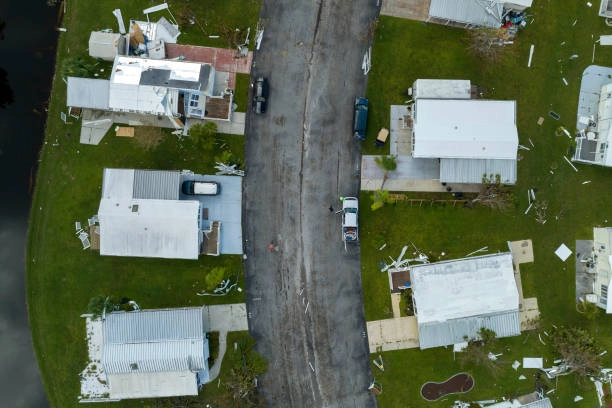
Mobile Home Demolition in Phoenix, Arizona
Starting a mobile home demolition project in Phoenix requires a team skilled in handling every detail from start to finish. Arizona Demolition Experts stand ready to guide you through this process with expertise and precision. Specializing in mobile home, residential, and building demolition, we bring unmatched professionalism to every job. Our services encompass thorough assessments, securing necessary permissions, and selecting the optimal demolition approach tailored to your specific needs.
With a focus on safety, compliance with all regulations, and a commitment to environmental sustainability, our team ensures a seamless operation. Whether it’s making way for new construction or clearing a site, Arizona Demolition Experts is your trusted demolition contractor in Phoenix, AZ. For a project managed with efficiency and care, contact us today at (480) 674-8348.
